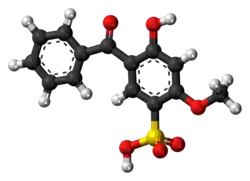Sulisobenzone
 | |
 | |
| Names | |
|---|---|
| Preferred IUPAC name
5-Benzoyl-4-hydroxy-2-methoxybenzene-1-sulfonic acid | |
| Other names
Benzophenone-4
| |
| Identifiers | |
3D model (JSmol)
|
|
| ChemSpider | |
| ECHA InfoCard | 100.021.612 |
| KEGG | |
PubChem CID
|
|
| UNII | |
CompTox Dashboard (EPA)
|
|
| |
| |
| Properties | |
| C14H12O6S | |
| Molar mass | 308.31 g/mol |
| Appearance | Light-tan powder |
| Melting point | 145 °C (293 °F; 418 K) |
| 1 g per 4 mL | |
Except where otherwise noted, data are given for materials in their standard state (at 25 °C [77 °F], 100 kPa).
Infobox references
| |
Sulisobenzone (benzophenone-4) is an ingredient in some sunscreens which protects the skin from damage by UVB and UVA ultraviolet light.[2][3]
Its sodium salt, sulisobenzone sodium, is also referred to as benzophenone-5.
References
- ^ Merck Index, 11th Edition, 8963.
- ^ Nohynek GJ, Schaefer H (June 2001). "Benefit and risk of organic ultraviolet filters". Regul. Toxicol. Pharmacol. 33 (3): 285–99. doi:10.1006/rtph.2001.1476. PMID 11407932.
- ^ Skin cancer foundation: Understanding UVA and UVB